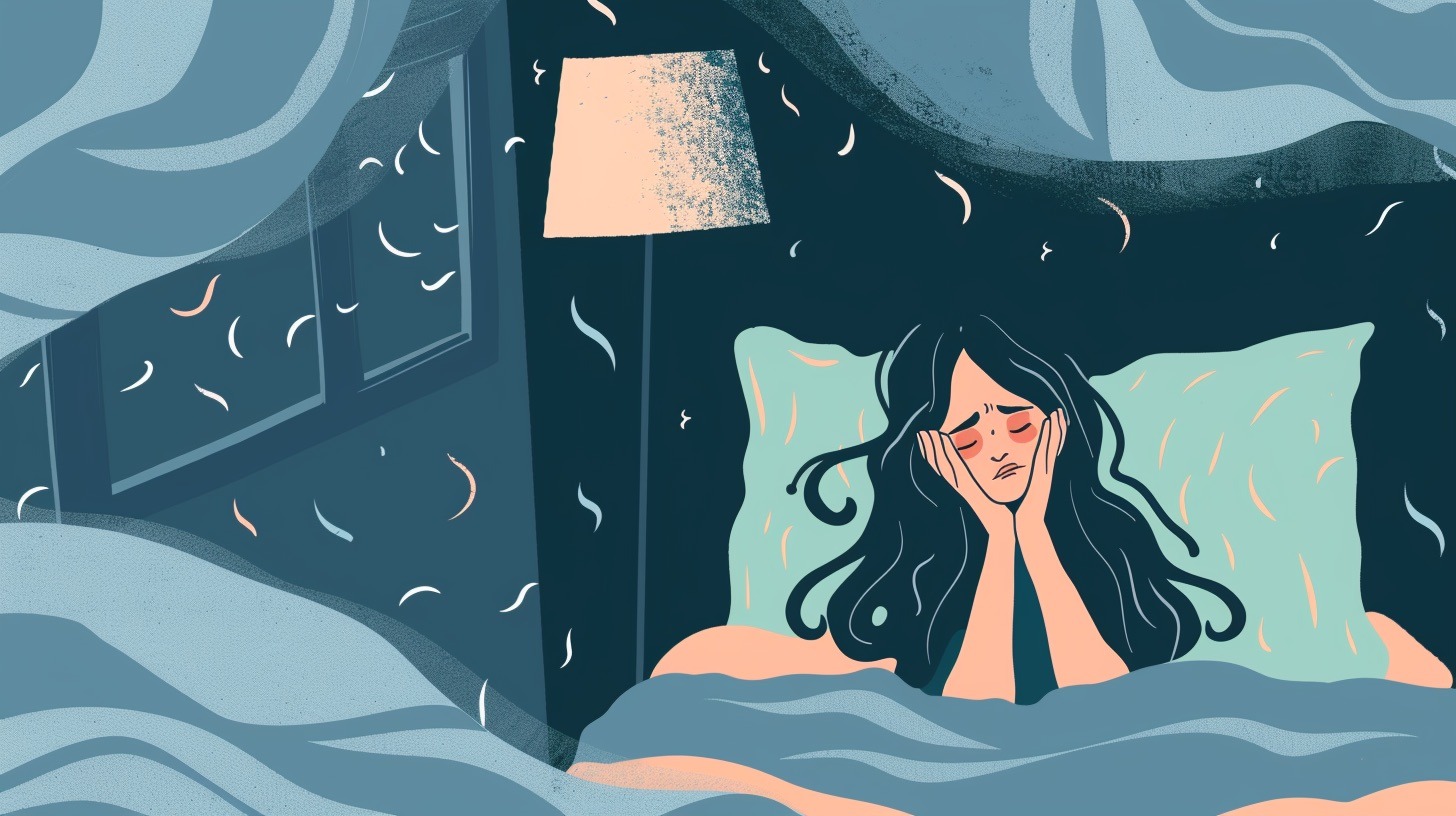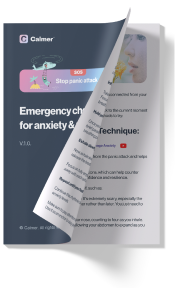Key Takeaways:
- Melatonin plays a crucial role in promoting relaxation and helping you fall asleep
- Some studies suggest that it may help alleviate anxiety symptoms
- Before starting melatonin supplementation, you need to be aware of potential adverse effects
- Nightmares and hallucinations are potential side effects associated with melatonin use
- There are two types of melatonin, and deciding on which one to take is extremely important
Melatonin can be a game-changer for some people who struggle with sleep, especially if they have jet lag, work shifts, or have anxiety.
I first heard of its benefits when I was working night shifts and seriously struggled to relax and fall asleep the next morning.
I read articles and studies about its use in treating sleep problems and naturally thought that I’d be doing myself a favor by trying it.
I mean, it’s an over-the-counter supplement, how bad could it be? Well, it turns out that if you also have anxiety (like I did), it could be pretty bad.
But let’s slow down a bit and see briefly what melatonin is, why it’s important, and who should take it.
Understanding melatonin: What is it and how does it work?
There are now countless books that tout melatonin as a silver bullet for all sorts of issues. From curing cancer and boosting the immune system to reversing aging, it’s being called the “miracle molecule” by (too) many so-called experts.
But melatonin is a hormone our bodies produce naturally:
It’s produced by the pineal gland in your brain, and its primary job is to regulate your sleep-wake cycle, also known as your circadian rhythm.
Imagine it as your body’s built-in sleep switch.
Simply put, when the sun is setting and the darkness starts creeping in, your brain gets the signal to start producing melatonin.
Still, it’s much more than that. It also helps support your immune system and antioxidant activity and is an important cog in keeping you healthy overall.
So let me expand on its potential benefits for a minute before we go through the side effects, and I share with you what happened when I first took it.
Does melatonin help with anxiety? Examining the research
Research on the potential benefits of melatonin for anxiety is still evolving, but some studies suggest that it offers certain advantages in managing anxiety symptoms.
Researchers mostly focus on patients scheduled for surgery. As you know, the night before you’re going “under the knife” is very stressful, and it fills most people with incredible anxiety.
I relatively recently had to take out all four of my wisdom teeth, and I was worried and anxious about the procedure for two weeks.
That’s why most hospitals give their patients benzodiazepines because it helps them relieve anxiety and makes them relaxed and sleepy.
However, some started giving them melatonin after many studies showed that melatonin worked the same or better than placebo, midazolam, alprazolam, and oxazepam.
As we know, anxiety and sleep problems often go hand in hand:
If you don’t get enough sleep, your whole day will be messed up, and you’ll be even more wound up and anxious.
On the other hand, if you have good sleep quality, you typically have reduced anxiety levels during the day.
Since melatonin regulates the sleep-wake cycle and promotes relaxation, some people find that taking melatonin supplements can help reduce feelings of anxiety and promote a sense of calm before bedtime.
It also has natural soothing properties that help calm the nervous system. By promoting relaxation and reducing restlessness, it alleviates some of the physical symptoms of anxiety, such as muscle tension and racing thoughts.
Still, some people aren’t aware that melatonin shouldn’t be the primary treatment for anxiety disorders.
That’s typically reserved for a combination of psychotherapy, medication, and lifestyle modifications.
Just because taking melatonin supplements right now is popular doesn’t mean you should do it.
So, it seems that the jury is still out, and melatonin’s effectiveness for anxiety varies from person to person, but also depends on which kind of melatonin you take.
Fast-release and slow-release melatonin
Just like many other supplements or medications, melatonin also comes in a fast-release and a slow-release version.
Fast-release melatonin
| Pros | Cons |
| Rapidly absorbed by the body | Wears off faster |
| Ideal for falling asleep | Might mess with your sleep during the night |
| Can take it closer to bedtime | Doesn’t last as long for keeping you asleep |
| Gives you vivid dreams and nightmares |
Fast-release melatonin will be rapidly absorbed by the body, leading to quick action. It’s typically recommended for people who need help adjusting their sleep-wake cycle.
It usually takes effect within 30 minutes to an hour after ingestion. But, as you’ll see below, that could also be the reason some of its adverse effects happen to so many people.
Slow-release melatonin
| Pros | Cons |
| Supports your sleep all night long | Takes time to kick in |
| Less chance of waking up in the middle of the night | Might leave you groggy in the morning |
| Helps you stay asleep | Need to take it earlier to line up with bedtime |
Slow-release or extended-release melatonin releases melatonin gradually over an extended period. This means that it will be released throughout the night and not just in the first hour.
This can help your body to maintain melatonin levels and support more sustained sleep throughout the night. And you probably won’t have as many vivid dreams.
That’s why this type of melatonin should be preferred if you have difficulty staying asleep or if you wake up frequently during the night.
Risks and considerations: Side effects and interactions with melatonin
While melatonin is often used to regulate sleep patterns, improper use or timing of melatonin supplements can disrupt the body’s natural circadian rhythm, leading to further sleep disturbances.
The other day, my friend was sharing her experience with melatonin supplements, and it was quite an eye-opener.
She was saying how she tried it to help with her sleep, but, oh man, did she have a rough time.
She described waking up in the middle of the night feeling like her stomach was staging a revolt. She had nausea, cramps, the whole works.
Turns out, these kinds of digestive issues are really common in some people who take melatonin.
Studies like this one show that melatonin also aggravates bowel inflammation in some people.
The same study highlights that “We started out in this study with the assumption that we might be able to develop a novel treatment for Crohn’s disease and ulcerative colitis, but to our surprise, we found exactly the opposite, and patients should be made aware of this danger.”
Basically, some parts of the bacteria living in your gut can cause more inflammation and mess up how your immune system works when you take melatonin. This can end up hurting your digestive system.
Most importantly, melatonin isn’t suitable for pregnant or breastfeeding women, children, people with certain medical conditions, or those taking specific medications without consulting a healthcare professional.
Plus, the long-term effects of melatonin use aren’t fully understood, particularly with prolonged or high-dose use. That’s why you should use melatonin supplements cautiously.
My experience with melatonin
And now, for the most interesting part, and the one that I faced when I first tried to use melatonin to relax and relieve my anxiety, racing thoughts, and inability to fall asleep.
Many people, including myself, report having nightmares, hallucinations, and “hangovers.”
Now, if you’re not familiar with how much melatonin you should actually take, you’re not the only one. You see, the most effective dose for improving symptoms of anxiety isn’t evident.
Successful clinical studies have used 3-10 mg doses before bedtime. Anything above that hasn’t been proven to work better.
I stayed on the safe side with 3 mg while some of the people I know were taking 5, 10, or even 20 mg each night.
Did it help me fall asleep? It did. But then I woke up after some of the worst nightmares I’ve ever had in my life.
I looked at my phone, thinking it must be time to wake up soon, or at least I was hoping for it.
But alas, only an hour passed, and the rest of the time, I spent tossing and turning, trying to fall asleep again.
Was I afraid I’d continue dreaming these god-awful dreams? I sure was. I was also dead tired and hoped this whole ordeal would pass by quicker if I just fell asleep again.
You know, when I first started trying melatonin supplements to help with my sleep, I wasn’t prepared for the unexpected side effects.
It was a real wake-up call for me to pay closer attention to how my body reacts to supplements and to always be prepared for the unexpected, even when it comes to something as seemingly harmless as a sleep aid.
Now, you might be thinking, surely you’ve done something wrong? You were taking other medication or supplements, or you had another medical condition, right?
Well, the simple truth is that I didn’t. I was just looking for something to help me with my anxiety and trouble falling asleep after coming home from my night shifts.
Here are some other experiences from regular people I found on Reddit:
seriously… i took two of the OLLY brand gummies four hours ago and i am wide awake.
it seems like i only sleep every other night and i’m terrified for my health.
u/bluehairtime
I’m new to trying melatonin but I read you’re supposed to take it an hour before you plan on sleeping. I did that and you know what happened? I was sleepy for 30 minutes then energized after that. Took me an hour to sleep (2 hours after taking the melatonin) after I finally went to bed.
u/flower4556
Worst panic attack taking melatonin last night.
Was half awake and half asleep. Stuck in a lucid nightmare. Every time I would drift off, my body would jerk awake. The strength of the sleepiness got stronger and stronger like it was trying to kill me. I was hallucinating after a few hours.
Finally fell asleep. Woke up feeling drunk and out of it. Bad headache.
Never again.
u/dswenson123
I took 1mg of melatonin one time and never again. Those nightmares still haunt me to this day!
u/AffectionateRespect7
Yeeeeppp I survive approximately one sleep with melatonin but if I push a second day I get the most horrific, disgusting, anxiety inducing nightmares of my life (3mg btw)
u/mushroomappreciation
Have GAD and panic attacks. I agree with you. Gave me horrible nightmares and amplified my anxiety. I seemed to be more angry when taking it
u/Dialthetrekwarsgate
Melatonin actually has the opposite effect for me then it’s suppose to. It will keep me awake. Practically WIRED. It messed with my anxiety and my restless leg syndrome. That was the main reason I had quit taking it.
Other side effects included: horrid nightmares/night terrors (I’ve had them my entire life but everytime I took melatonin it would make them worse). Hot flashes. Waking up every hour/simply restless.
u/luna_sitz
As my problems didn’t just magically disappear by using melatonin (I tried it on a couple of other occasions again), I had to look for other solutions.
Other methods of dealing with anxiety
Now, there are basically countless methods people have used to deal with their anxiety. In my case, the following science-backed methods ultimately helped, but there may be others that are more suitable for you, including therapy (CBT) and medications.
Before you go down that route, here are the things you can try right now:
White noise
I learned that white noise can be a fantastic tool for managing anxiety and improving sleep quality.
It’s just such a steady, consistent sound that masks other noises in your environment, making it easier to relax and fall asleep.
Right now, I’m using an air purifier that has a calming hum and cleans the air at the same time, which helps with my stuffed nose.
Breathing exercises
Breathing exercises are like little pockets of calm in the midst of chaos. They’re simple techniques that can help slow down racing thoughts, reduce stress, and help you relax.
You can try quite a few, but the one I like the most is counted breathing:
You inhale quietly through your nose for a count of four, hold your breath for a count of seven, then exhale slowly and completely through your mouth for a count of eight.
Video games
I always loved playing video games. Still, I’ve never thought of them as something that could help me relieve my anxiety.
I actually stopped playing them for many years because I was simply too busy. Work, family, and countless other things took precedence.
But I finally started playing them again, specifically as an anti-anxiety tool. And guess what? It worked as they helped me:
- Divert attention away from anxious thoughts and worries,
- Help me connect with friends or meet new people online,
- Give me a sense of accomplishment,
- Counteract feelings of anxiety and inadequacy,
- And much more.
Meditation
Meditation techniques, such as guided meditation, helped me calm my mind and body and reduce stress levels.
By focusing on the present moment and letting go of worries about the past or future, I eased my anxiety symptoms after only a few tries.
Exercising
Physical activity, like running, going to the gym, or taking a yoga class, helps reduce levels of stress hormones like cortisol and adrenaline.
Now, I’ve tried doing all of them, but what works best for me is the jump rope workout. In half an hour, I give it my all and sweat out a ton of water and other sh*t from my system.
After that, I’m cool like a cucumber, and nothing can faze me anymore. Unfortunately, by going all out, I suffered a couple of injuries, meaning I had to scale down to doing it only up to three times per week.
Apps
There are plenty of apps available that can be helpful for managing anxiety. Surprisingly, they can help you a lot.
They offer a wealth of resources like guided meditation, anxiety relief tools, and even Cognitive Behaviour Therapy methods.
Most importantly, they remind you that it’s time to work on your anxiety and not to sweep it under the rug.
The bottom line
Melatonin isn’t a one-size-fits-all solution for anxiety and sleep problems. While it works wonders for some, for others, it can mess with their sleep patterns, give them terrifying nightmares, and leave them dazed and confused the next day.
Fast-release melatonin can help you fall asleep quickly, but it can also increase the risk of vivid and disturbing nightmares for some people.
On the other hand, slow-release melatonin offers prolonged sleep support throughout the night, with fewer interruptions, although it may take longer to take effect.
You need to find what works best for your body instead of just relying on what’s popular at the moment.




